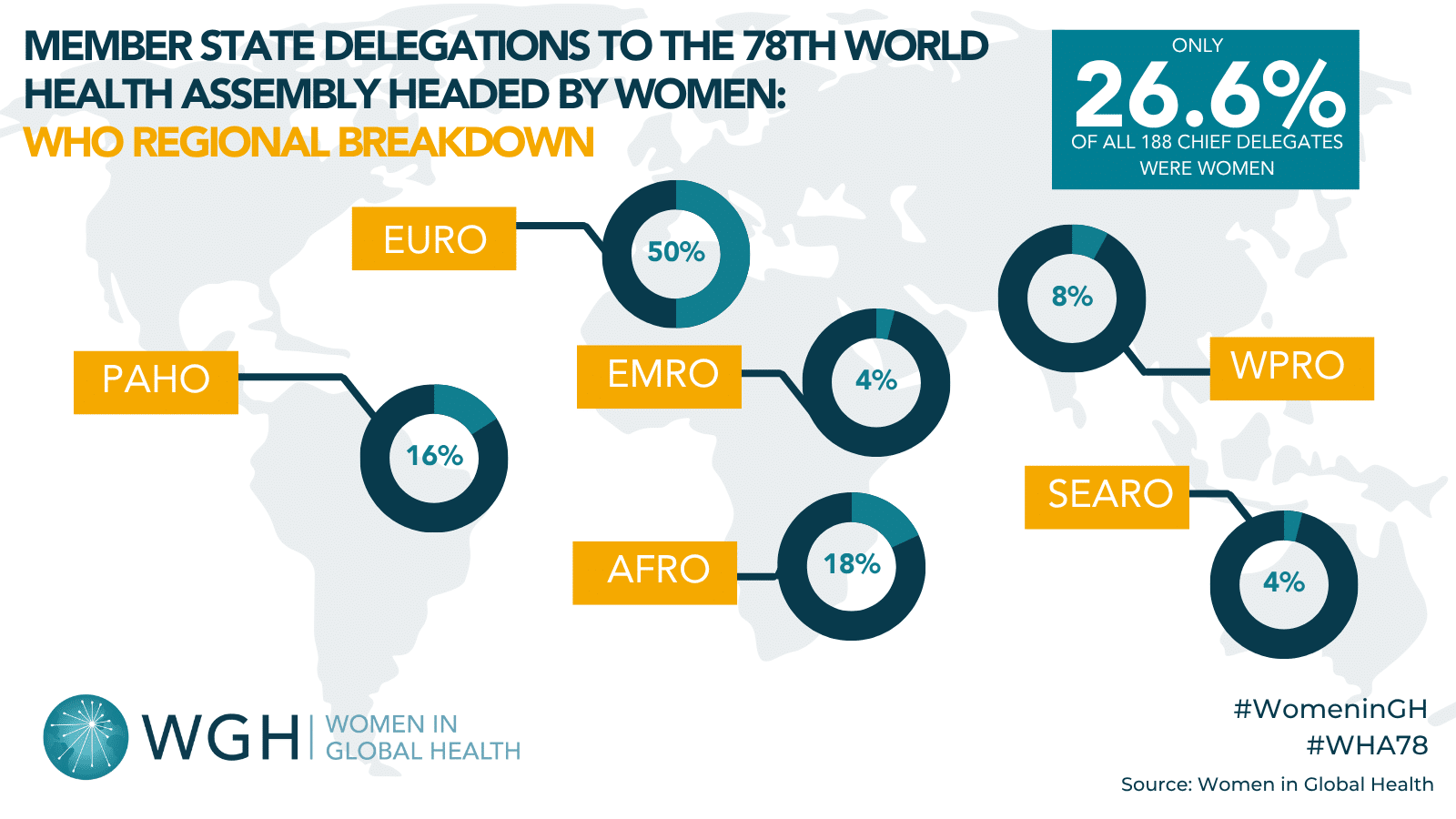WHA78: Annual count of women Chief Delegates
29 May 2025
At the 78th World Health Assembly (WHA78), Women in Global Health (WGH) continued its annual assessment of gender representation among Chief Delegates, an initiative begun in 2017 to track progress on gender equity in global health leadership. While just one in several other important indicators and without pretending to be comprehensive, this count serves as a powerful accountability tool, shedding light on persistent gender imbalances and urging policy reform to close the representation gap. This ongoing initiative is part of WGH’s broader advocacy efforts to promote gender equality and inclusive leadership in global health governance.

Key findings
- Total Chief Delegates: 188
- Male Chief Delegates: 138 (73.4%)
- Female Chief Delegates: 50 (26.6%)
- Countries/areas by WHO region breakdown:
- AFRO: 18%
- EMRO: 4%
- EURO: 50%
- PAHO: 16%
- SEARO: 4%
- WPRO: 8%

Despite global calls for more inclusive leadership, the 2025 data reflects a decline in women’s representation compared to recent years. In 2023, women accounted for 32% of Chief Delegates—then the highest figure since WGH began this count. In 2024, the number slightly dropped to 30%, and in 2025, representation has further fallen to 26.6%. Moreover, the breakdown of female Chief Delegates by WHO region/countries highlights a notable gap in representation from low- and middle-income countries (LMICs).
These figures highlight a persistent gender imbalance at the highest level of global health diplomacy and policy-making. While women constitute 70% of the global health workforce, their representation at decision-making levels remains disproportionately low.
Historical context:
- WHA76 (2023): WGH celebrated a record 32% women Chief Delegates—a 9% increase from the previous year. While this was seen as progress, WGH cautioned against complacency, noting that a ratio of 3 men to every woman still prevailed.
- WHA77 (2024): The percentage of women Chief Delegates dipped to 30%. WGH emphasized the need for urgent, transformative action, including ending the gender pay gap, eliminating unpaid labor, and creating safe, fairly compensated working environments for women in health.
- WHA78 (2025): Representation of women further declined to 26.6%, marking a concerning regression. This setback signals that gains in gender equality are not guaranteed and require sustained political will and institutional accountability.
The 2025 gender count shows a multi-year consecutive decline on the number of women leading in the global health space and reinforces long-standing trends. Despite global commitments to gender equality and inclusive governance, women remain significantly underrepresented in formal leadership roles at the WHA. Moreover, the breakdown of female Chief Delegates by WHO region and country highlights a notable gap in representation from low- and middle-income countries (LMICs).
Without proportional representation:
- Policy Gaps: Health policies fail to fully address the diverse needs of populations if the perspectives of women—particularly those on the frontlines of health care—are excluded from the decision-making process.
- Accountability Deficit: Gender parity in leadership is a key indicator of institutional accountability to gender equity goals outlined in global frameworks such as the Sustainable Development Goals (SDG 5 – Gender Equality) and SDG 3 (Good Health and Well-being).
- Lost Potential: Excluding women from leadership limits the innovation, insight, and effectiveness that diverse leadership brings to complex global health challenges.
Call to action:
WGH urges all Member States, global health institutions, and multilateral partners to take concrete steps toward gender parity in leadership. This includes:
- Setting and achieving measurable targets for women’s representation in official delegations, especially those in LMICs.
- Creating enabling environments for women’s participation and leadership.
- Holding institutions accountable for gender equity commitments.
Until leadership in global health reflects the gender composition of its workforce, the field will fall short of its own ideals of equity, fairness, and effectiveness.
Join us in this effort, by supporting our work or getting in touch to find out what you can do in your own context.